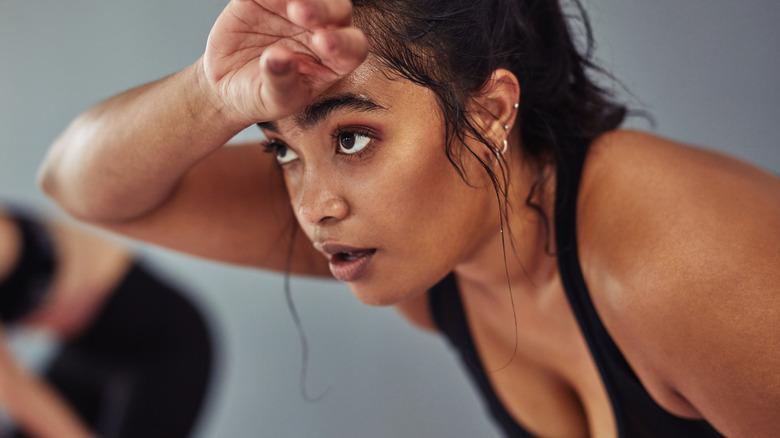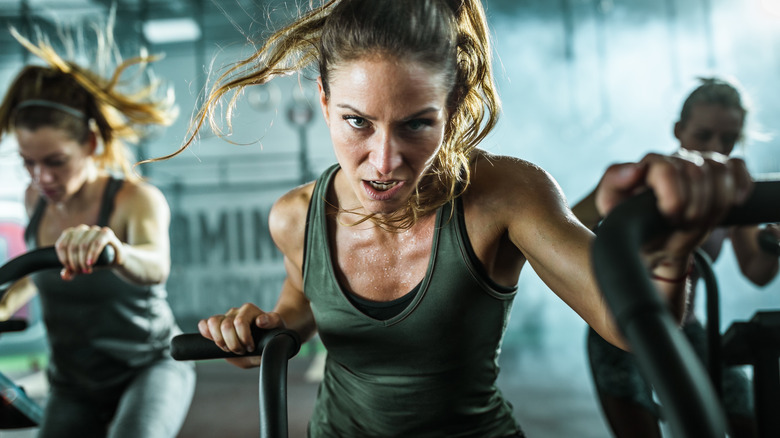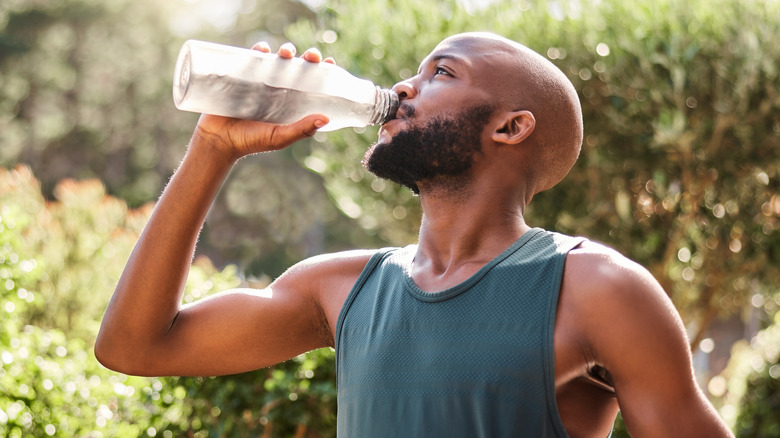What It Means When You Start Sweating Quickly After Beginning A Workout
Sweating is one of those important (yet smelly) bodily functions that keep us healthy. When your body's core temperature begins to rise, your 3 million or more sweat glands go to work to release the excess heat in your body. When temperatures reach triple digits, no amount of antiperspirant can stop those beads of sweat around your temples, your chest, your armpits, and other places. Going to the gym also means sweating if you want to get in a good workout.
You might notice that some people sweat more than others. According to Henry Ford Health, larger bodies sweat more because they generate more heat when they move. People who have lean muscle mass will also sweat a little more than someone with less muscle. Hormone changes, such as those that occur during pregnancy and perimenopause, will cause sudden sweat breakouts. If you and a friend start running on the treadmill at the same time, you could be reaching for your towel before your friend does. Fitter people will start sweating sooner than less fit people because their cooling system is preparing their bodies for a tougher workout (via Piedmont Healthcare).
Your sweat response adapts to your level of fitness
According to Carmichael Training System, your body begins to learn how to regulate your body temperature as you gain fitness. Your sweat response kicks in much sooner because it knows you mean business when you're working out. Your body begins to regulate your core temperature early, so you can work out longer. You might also notice that you're sweating more during your workout than your less fit friends because your body has become more effective at keeping your internal temperature cooler.
Your sweat will also be different as you become more fit. Typically, you lose water, sodium, potassium, and other electrolytes through your sweat. As your fitness improves, your body gets better at retaining the important electrolytes to help keep your fluid levels balanced. It's not that athletes need less hydration; athletes can sweat off up to 6% of their body weight during a workout (via Piedmont Healthcare). That's 9 pounds for a 150-pound athlete.
Keeping you cool during your workouts
Sweating just as your workout begins means you need to keep up your hydration while you work out. Staying hydrated during your workouts will help moderate your body temperature while keeping your joints lubricated. If you notice muscle cramps or dark urine, it might indicate you need to drink more fluids during your workouts (via Family Doctor).
The American Council on Exercise suggests drinking 17 to 20 ounces of water a few hours before your workout to set up your body for high performance. Within 30 minutes of your workout, drink another 8 ounces of fluid. While you're working out, drink 7 to 10 ounces of water every 20 minutes or so, and follow up with another 8 ounces when your workout is done. It's also a good idea to keep an eye on how much sweat you lose during a workout. If you find you've lost a few pounds through sweat, replace each pound lost with 16 to 24 ounces of fluid. For workouts lasting more than an hour, Family Doctor suggests consuming a sports drink to replenish electrolytes lost through sweat.



